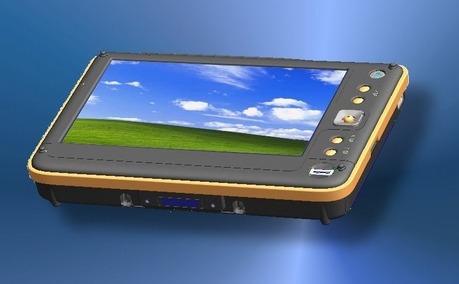Two New UMPCs

Variety is the spice of life, they say, and unless they're talking about the drivel that was my high-school Variety Performance I think they're right. So it's with baited breath I wait for new models of UMPC, in the hope that one day some clever manufacturer will manage the delicate balance between Alienware performance and Electrovaya battery life.

Innovation takes one step closer to tech nirvana, today, with the announcement of two new UMPCs. Firstly, for those of us who like our computers to be as S&M rubber-clad as our basement dungeons, the Mo-bits VX3 champions "ruggedised design"; so far it's unknown as to whether that means "you can kick it about on an oil rig and still get a DOS prompt" or is just a fashionable way of describing textured grip panels. What is known is that it's based on a reference design that will go into production this September (only without the masochist costume) and wields VIA's clever VX700 chipset that takes the strain off your UMPC's overtaxed processor by natively supporting WMV and mpeg-4. Clever stuff, if only the software was written to take advantage of it; users of rival UMPC the Easybook P7, also featuring VIA's native mpeg support, have found that video is just as processor intensive because media software supporting hardware decoding is pretty thin on the ground.
[via Carrypad]
Making a good case for the "most confusing button symbols on a UMPC 2006" award is our second new UMPC, only this time it's not even quite that. The Vega, a Korean ultra-portable, doesn't tick the standards boxes Microsoft demands for its monikered handhelds, with a squint-inducing 4.3" display falling something short of the recommended 7". Still, by the time you've decoded all those buttons the battery will probably have expired and the screen died, so it's not all that much of a problem. Usability cynicism aside, this Korean masterpiece of miniaturisation sports an AMD Geode LX800 processor, a 30gb hard disk and, disappointingly, just 256mb of ram.











[via Aving]
So, will this pair revolutionise the handheld PC scene? Probably not. But somebody's fancy is bound to be tickled by at least one of them, and with that Microsoft's dream of unfettered users continues unabated. Let's be generous and say that's a good thing.
